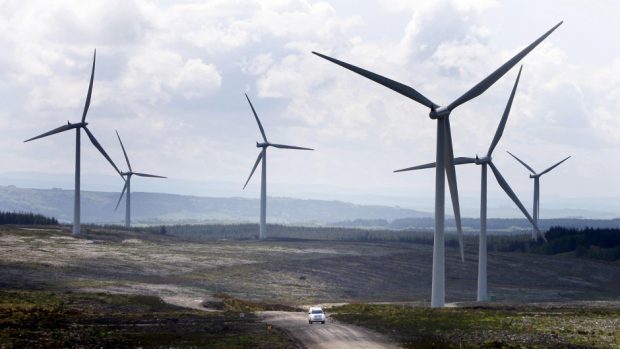Green power is meeting more than half of Scottish electricity demand for the first time, new figures show.
Scottish politicians and green groups hailed the figure, but warned further progress would be hindered by UK Government policy.
A total of 57.7% of electricity consumed was generated by renewable technologies in Scotland last year, up 7.9 percentage points on 2014, according to provisional statistics published yesterday by the Department of Energy and Climate Change (Decc).
It means Scotland has smashed through the halfway point in its quest to have renewable technology produce 100% of its electricity by 2020.
The Scottish Government had aimed to reach 50% by 2015, but ended up 7.7% ahead of the curve on the back of record levels of wind and hydro electricity generation.
Deputy First Minister John Swinney said Scotland had “continually led on climate change”, in stark contrast to the UK Government, which he said had snubbed renewables in favour of “extremely expensive and delayed” new nuclear power stations.
From a total of 21,900 gigawatt-hours (GWh) produced by renewables in Scotland last year, wind power provided 14,000-GWh – one-fifth more than in 2014. Hydro stumped up 5,800GWh last year, a 7.2% increase.
For the UK as a whole, 24.7% of electricity came from green projects in 2015, compared with 19.1% a year earlier.
Last year saw renewables produce a record 83,300GWh of electricity in the UK, up almost a third on the previous 12 months.
The UK’s offshore wind generation rose by 29.9% and onshore wind by 23.8%, thanks to increased capacity and high wind speeds, while hydro was up 7.4%.
But critics of UK Government policy fear increases in green-power generation on a similar scale will be difficult to achieve in the coming years.
Following last year’s general election, the new Conservative government said it would scrap subsidies for new onshore wind farms under the renewables obligation scheme a year early.
It also reduced payments to existing small-scale wind, hydro and solar projects via the feed-in tariff system, adding more weight to concerns the administration is “anti-green power”.
Scottish Renewables policy director Jenny Hogan said the sector still had scope for growth but accused Westminster of setting Scotland “on a path to fall short of the 2020 target”.
Richard Dixon, director of Friends of the Earth Scotland, said the figures showed Scotland had taken an important step towards becoming “fossil-free”, despite the UK Government’s “ideological assault” on renewable energy.
But Helen McDade, head of policy at conservation charity John Muir Trust, which has opposed the spread on onshore turbines, said wind power’s contribution to UK electricity generation was still negligible.
Ms McDade added: “The intermittency of wind production means that Scotland already has more wind turbines than the grid can easily cope with.”
